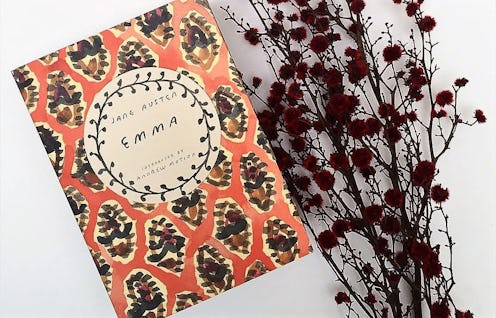Books
The Most Beautiful Sentences In Jane Austen Novels
If you’re a fan of Jane Austen (and honestly, isn’t most every book lover?) then you already know the 19th century novelist wrote more than beautiful love stories (albeit filled with irony, humor, social criticism, and non-traditional female protagonists.) She also wrote beautiful sentences — some of the most beautiful sentences in English literature, depending on who you ask. It’s just one reason why, in the 204 years since Pride and Prejudice was first published (and the 206 since Jane Austen’s first novel, Sense and Sensibility) readers and writers have been turning to Austen’s literary skill for entertainment and inspiration in equal measure. And it’s also why, in the two-plus centuries that Austen’s books have been making their way onto readers’ shelves, her novels have almost never been out of print. (That’s a lot of Mr. Darcy over the decades.)
Now, with the 200th anniversary of Jane Austen’s final novel approaching — the unfinished Sanditon, dated March 18, 1817 and published incomplete and posthumously in 1925 — it’s the perfect time to revisit some of the things readers have long loved about Jane Austen. Including all that great 18th and 19th century language. Here are 15 of the most beautiful sentences in Jane Austen.
1“I cannot fix on the hour, or the spot, or the look or the words, which laid the foundation. It is too long ago. I was in the middle before I knew that I had begun.”
― Fitzwilliam Darcy, Pride and Prejudice
2“Know your own happiness. You want nothing but patience — or give it a more fascinating name, call it hope.”
― Mrs. Dashwood, Sense and Sensibility
3“If I loved you less, I might be able to talk about it more.”
― George Knightley, Emma
4“Give a loose to your fancy, indulge your imagination in every possible flight…”
― Elizabeth Bennet, Pride and Prejudice
5She was feeling, thinking, trembling about everything; agitated, happy, miserable, infinitely obliged, absolutely angry.
― Jane Austen, Mansfield Park
6"The last few hours were certainly very painful. But when pain is over, the remembrance of it often becomes a pleasure. One does not love a place the less for having suffered in it…”
― Anne Elliot, Persuasion
7She sat silently meditating, in a fixed attitude, for a few minutes. A few minutes were sufficient for making her acquainted with her own heart. A mind like hers, once opening to suspicion, made rapid progress; she touched, she admitted, she acknowledged the whole truth.
― Jane Austen, Emma
8“Where the waters do agree, it is quite wonderful the relief they give.”
― Mrs. Elton, Emma
9"I can listen no longer in silence. I must speak to you by such means as are within my reach. You pierce my soul. I am half agony, half hope. Tell me not that I am too late, that such precious feelings are gone forever. I offer myself to you again with a heart even more your own than when you almost broke it... Dare not say that man forgets sooner than woman, that his love has an earlier death. I have loved none but you. Unjust I may have been, weak and resentful I have been, but never inconstant.
― Captain Frederick Wentworth, Persuasion
10It was a gloomy prospect, and all that she could do was to throw a mist over it, and hope when the mist cleared away, she should see something else.
― Jane Austen, Mansfield Park
11“What delight! What felicity! You give me fresh life and vigor. Adieu to disappointment and spleen. What are men to rocks and mountains? Oh! what hours of transport we shall spend! And when we do return, it shall not be like other travelers, without being able to give one accurate idea of anything. We will know where we have gone — we will recollect what we have seen.”
― Elizabeth Bennet, Pride and Prejudice
12“Teach us... that we may feel the importance of every day, of every hour, as it passes.”
― Jane Austen, Jane Austen Prayers
13Reflection must be reserved for solitary hours; whenever she was alone, she gave way to it as the greatest relief; and not a day went by without a solitary walk, in which she might indulge in all the delight of unpleasant recollections.
― Jane Austen, Pride and Prejudice
14They walked on, without knowing in what direction. There was too much to be thought, and felt, and said, for attention to any other objects.
― Jane Austen, Pride and Prejudice
15“My characters shall have, after a little trouble, all that they desire.”
― Jane Austen (character), Becoming Jane (film)
